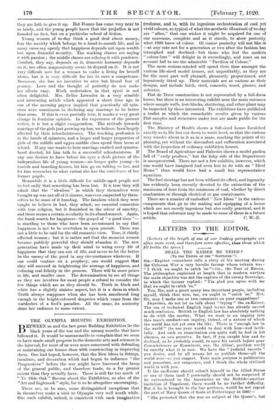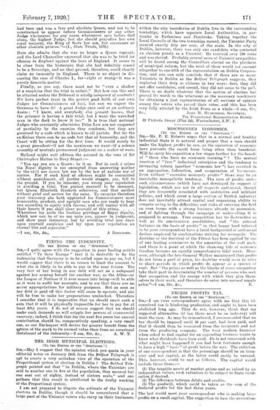LETTERS TO - THE EDITOR.
[Letters of-the length of one of our leading paragraphs are often more read, and therefore more efiective, thaw those which fill treble the space.]
SHALL THE KAISER BE TRIED
[To THE EDITOR or THE " SPECTATOR."] Sm,—Bagehot somewhere tells a story of his meeting during the Crimean War a very bucolic farmer whose refrain was : " I think we ought to catch 'ee"—viz., the Tsar of Russia. The philosopher explained at length that in modern warfare the main objective was not the capture of the enemy Sovereign, to which the farmer replied: " I'm glad you agree with me that we ought to catch 'ee."
You, Sir, and a great many less important people, including myself, think that now, too, we ought to "catch 'ee:" But, Sir, may I make one or two comments on your suggestions?
Imprimis, do not let us talk about " trying " the ex-Kaiser. The use of technical English legal terms has already caused much confusion, British or English law has absolutely nothing to do with the matter. What we want is an inquiry into this man's conduct—an inquiry, indeed, of a nature of which the world has not yet seen the like. There is " enough law in the world" (to use your words) to deal with him—and faith- fully. And such an examination can quite well be had in his absence, as you perceive. In fact, if you caught him and he declined, as he probably would, to open his mouth before your Commissioners or Examiners, our, the Allies', position would be exactly what it is now. We have the "judicial records" you desire, and by all means let us publish them—all the world over—as you suggest. Your main purpose is publication and precedent, not vengeance, and I think the whole civilized world is with you.
If the ex-Kaiser should. submit himself to the Allied States or one of them (and I personally should not be surprised if he surrendered to the Americans or the British—another imitation Of Napoleon), there would be no further difficulty. But if he is brought to the bar perforce, would he not repeat the part of Mary Queen of Scots at Fotheringay in 1586?— " She protested that she was no subject of the Queen's, but
had been and was a free and absolute Queen, and not to be constrained to appear before Commissioners or any ether Judge whatsoever for any cause whatsoever save before God alone, the highest Judge, lest she should prejudice her own royal majesty, the King of Scots her son, her successors or other absolute princes."—(I., State' Trials, 1173.) Here she admits that she was no longer a Queen regnant, and the Lord Chancellor answered that she was to be tried for offences in England against the laws of England. It seems to be clear from the historians that she had definitely ceased to be a Sovereign, and on that ground, therefore, could clearly claim no immunity in England. There is no object in dis- cussing the case of Charles I., for—right or wrong—it was a purely domestic. matter.
Finally, as you say, there must not be "even a shadow of a suspicion that the trial is unfair." But how can this end be attained unless the Tribunal is wholly composed of neutrals? We have perfect trust in the perfect good faith of our own Judges (or Commissioners ad hoc), but can we expect the Germans to have it? A great Judge once said at an ordinary Assize : "I know, and everybody else present knows, that the prisoner is having a fair trial, but I want the wretched man in -the dock to know it too." It is true that national Judges who constantly administer Prize Law are not suspected of partiality by the enemies they condemn, but they are governed by a code which is known to all jurists. But for the ex-Kaiser there can be no code but that of humanity, and the Court will be sitting for the first time. It would surely be a great precedent—if not the maximum we want—if a solemn assembly of neutrals pronounced judgment on a maker of wars.
Holland might well address the accused in the tone of Sir Christopher Hatton to Mary Stuart :-
" You say you are a Queen : be it so. But in such a crime the Royal dignity is not exempted from answering neither by the civil nor canon law nor by the law of nations nor of nature. For if such kind of offences might be committed without punishment, all justice would stagger, yea, fall to the ground. If you be innocent, you wrong your reputation in avoiding a trial. You protest yourself to be innocent, but Queen Elizabeth thinketh otherwise, and that neither without grief and sorrow for the same. To examine therefore your innocency she hath appointed for Commissioners most honourable, prudent, and upright men who are ready to hear you according to equity with favour, and will rejoice with all their hearts if you shall clear yourself of this crime. . . . Wherefore lay aside the bootless privilege of Royal dignity, which now can be of no use unto you, appear in judgment, and show your innocency, lest by avoiding trial you draw upon yourself suspicion and lay upon your reputation an eternal blot and aspersion."







































 Previous page
Previous page